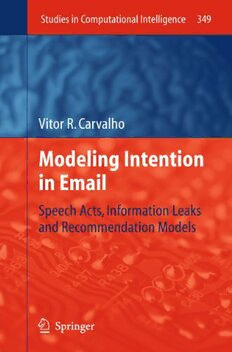
Modeling Intention in Email: Speech Acts, Information Leaks and Recommendation Models PDF
117 Pages·2011·1.619 MB·English
Most books are stored in the elastic cloud where traffic is expensive. For this reason, we have a limit on daily download.
Preview Modeling Intention in Email: Speech Acts, Information Leaks and Recommendation Models
Description:
Everyday more than half of American adult internet users read or write email messages at least once. The prevalence of email has significantly impacted the working world, functioning as a great asset on many levels, yet at times, a costly liability. In an effort to improve various aspects of work-related communication, this work applies sophisticated machine learning techniques to a large body of email data. Several effective models are proposed that can aid with the prioritization of incoming messages, help with coordination of shared tasks, improve tracking of deadlines, and prevent disastrous information leaks. Carvalho presents many data-driven techniques that can positively impact work-related email communication and offers robust models that may be successfully applied to future machine learning tasks.
See more
The list of books you might like
Most books are stored in the elastic cloud where traffic is expensive. For this reason, we have a limit on daily download.
